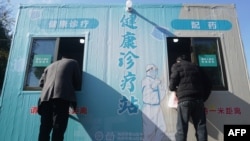ສະຫະລັດໃນວັນອັງຄານວານນີ້ ໄດ້ສະເໜີທີ່ຈະແບ່ງປັນຢາວັກຊີນ ໃຫ້ກັບຈີນເພື່ອສະກັດກັ້ນການເພີ້ມຂອງກໍລະນີໂຄວິດ-19 ໂດຍກ່າວວ່າ ການຄວບຄຸມການແຜ່ລະບາດແມ່ນຢູ່ໃນຜົນປະໂຫຍດຂອງໂລກ ອີງຕາມລາຍງານຂອງອົງການຂ່າວຝຣັ່ງ (AFP).
ເບິ່ງຄືວ່າຈີນຈະບໍ່ຮັບເອົາການສະເໜີຂອງສະຫະລັດ ທີ່ມັກເປັນຄູ່ສັດຕູກັນຢູ່ເລື້ອຍໆ ຫລັງຈາກປັກກິ່ງໄດ້ລົງທຶນຢ່າງໜັກໃນການທູດໂຄວິດ-19 ທີ່ຮວມທັງການສົ່ງຢາວັກຊີນຜະລິດຢູ່ໃນບ້ານຂອງຕົນ ໄປຍັງທົ່ວໂລກ.
ທ່ານເນັດ ໄພຣສ໌ ໂຄສົກກະຊວງຕ່າງປະເທດສະຫະລັດ ກ່າວຕໍ່ບັນດານັກຂ່າວວ່າ “ມີຄວາມສຳຄັນທີ່ປະເທດທັງໝົດເຈາະຈົງໃສ່ໃຫ້ຄົນໄດ້ຮັບການສັກຢາແລະ ທຳການກວດ ແລະມີການປິ່ນປົວໄດ້ຢ່າງສະບາຍ.”
ທ່ານໄພຣສ໌ ກ່າວວ່າ “ສະຫະລັດເປັນຜູ້ບໍລິຈາກທີ່ໃຫຍ່ສຸດຢາວັກຊີນກັນໂຄວິດ-19 ຢູ່ໃນທົ່ວໂລກ. ພວກເຮົາໄດ້ກະກຽມທີ່ຈະສືບຕໍ່ໃຫ້ການສະໜັບສະໜູນແກ່ຄົນຢູ່ທົ່ວໂລກຮວມທັງຈີນ ພ້ອມດຽວກັນນີ້ ແລະການສະໜັບສະໜູນສຸຂະພາບທີ່ພົວພັນກັບໂຄວິດ.
“ນີ້ເປັນທີ່ເພິ່ງພໍໃຈທີ່ສຸດຕໍ່ຜົນປະໂຫຍດແກ່ໂລກທັງໝົດ. ຢາວັກຊິນກັນໂຄວິດ-19 ເປັນທີ່ປອດໄພແລະໄດ້ຜົນ ແລະພວກເຮົາໄດ້ແຈກຢາຍຢາເຫລົ່ານີ້ໃຫ້ແກ່ປະເທດຕ່າງໆຢູ່ໃນທົ່ວໂລກ ບໍ່ກ່ຽວຂ້ອງເລີຍ ຫລືເຖິງແມ່ນວ່າ ບໍ່ເຫັນດີທາງດ້ານການເມືອງນຳກໍຕາມ.”
ທ່ານໄພຣສ໌ ກ່າວວ່າ ມີກໍລະນີເຕັມຢູ່ໃນປະເທດຈີນ ທີ່ເປັນປະເທດເສດຖະກິດໃຫຍ່ສຸດອັນດັບສອງຂອງໂລກ ຊຶ່ງຈະສ້າງຄວາມສູນເສຍໃຫ້ແກ່ທັງດ້ານມະນຸດ ແລະເສດຖະກິດ.
The United States on Tuesday offered to share vaccines with China to stem soaring COVID-19 cases, saying containing the outbreak was in the interest of the world.
It is unlikely that China would accept the offer from the United States, its frequent adversary, after Beijing invested heavily in COVID-19 diplomacy that included shipping its homegrown vaccines around the world.
"It's important that all countries focus on getting people vaccinated and making testing and treatment easily available," State Department spokesman Ned Price told reporters.
"The U.S. is the largest donor of COVID-19 vaccines around the world. We're prepared to continue to support people around the world, including in China, with this and other COVID-related health support," Price said.
"This is profoundly in the interests of the rest of the world. Our COVID-19 vaccines are safe and effective, and we have provided them to countries around the world, regardless or in spite of any political disagreements."
Price said that the caseload in China, the world's second-largest economy, had both human and economic costs.




